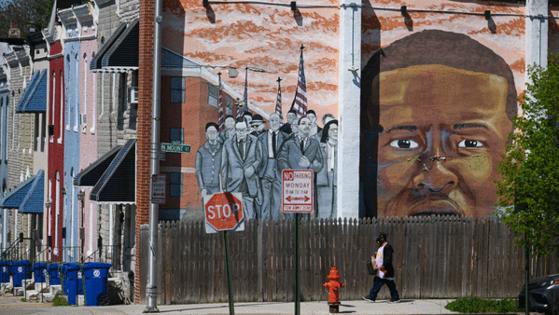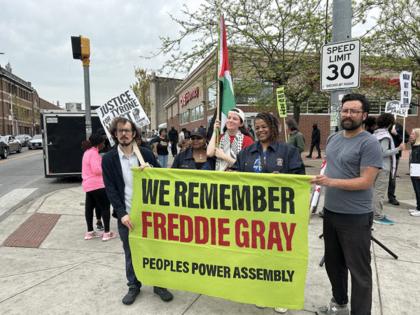Maryland Legislature slow to pass policing reforms after Freddie Gray's death
Published in News & Features
BALTIMORE — Jill Carter, a Baltimore Democrat who served in both the state Senate and House of Delegates, sponsored police reform bills throughout her 20-year political career, including a bill that failed mere weeks before Freddie Gray, a 25-year-old Black man, died of injuries he sustained while in police custody.
In Carter’s opinion, had the Legislature not “turned a blind eye to the nature of police reform” in 2014 and 2015 “it is quite possible Freddie Gray might not have been killed,” she said.
Ultimately, Black women like Carter took the lead on passing substantive police reform policy — six years later.
‘Due for some changes’
Late House Speaker Michael E. Busch and Senate President Thomas V. Mike Miller Jr., both Democrats, convened a 20-member Public Safety and Policing Work Group in the months after Gray’s death to study law enforcement training resources, hiring and recruiting practices and community engagement policies.
Former Baltimore Mayor Catherine Pugh served as the workgroup’s Senate chair. Pugh, who was a state senator at the time of Gray’s death, declined to be interviewed for this story.
The work group was also tasked with reviewing the Law Enforcement Officers’ Bill of Rights.
Enacted in 1974, the Law Enforcement Officers’ Bill of Rights provided procedural due process protections for investigations into officers who were facing potential disciplinary action, demotion or job loss based on internal or external complaints.
Under that law, police officials had to wait 10 days before interrogating an officer regarding the substance of the complaint against them. Officers would then be subject to an administrative hearing to determine if they were guilty. If the board, which was composed of other law enforcement members, determined that the officer was guilty, it would make a disciplinary recommendation to the agency’s chief, who had the ultimate authority over punitive outcomes.
For officers to face potential disciplinary action, complaints had to be filed within 90 days of the incident in question.
Maj. Neill Franklin, a retired police officer and the former executive director of the Law Enforcement Action Partnership, said in an interview with The Baltimore Sun that the Law Enforcement Officers’ Bill of Rights was necessary when it came about in the ‘70s, but had “outlived its time” when it was under review in this millennium.
“During that time, police officers did have problems with being persecuted by some of their administrators … and so the protection came about regarding hearings, how they had to take place, what protections they had — basically their rights having a representative, so on and so forth,” said Franklin, who testified in Annapolis in favor of reform of the law. “But where we are now, needing significant reforms of policing, the Law Enforcement Officers’ Bill of Rights was due for some changes.”
To Franklin, it came down to civilians needing transparency and power regarding disciplinary actions for the officers who patrol their communities. He said they believed the Law Enforcement Officers’ Bill of Rights provided too much protection for police who were abusing their power and, in some instances, “were actually using force to the level where it was an actual assault and battery.”
A push for reform
But Carter said there was a public appetite for police reform legislation at the start of the 2015 session, months before Gray died in police custody.
Before Gray’s death, the movement for police reform was ignited in the United States by a series of nationally highlighted use-of-force incidents, including the 2014 police killings of Michael Brown in Ferguson, Missouri; Tamir Rice in Cleveland, Ohio; and Eric Garner in New York.
Franklin said that the advent of camera phones, allowing civilians to provide evidence of use-of-force incidents, brought forth a new push toward reform.
“I remember the appetite from the public for police reform has always been there,” he said. “The Black community was saying, ‘This is what we’ve been trying to tell you over the past few decades.’”
Carter, who was serving in the House of Delegates at the time, sponsored legislation during the 2015 session to alter several provisions.
Under her bill, the 10-day waiting period for officer interrogations would have been stricken. Civilians would have been allowed to sit on administrative hearing boards, which would convene upon the officer’s request after the police chief issued a decision of guilt and proposed disciplinary action. The board would have then either affirmed or overturned the chief’s decision. Complaints could have been filed for up to a year after the offense was committed.
Carter’s 2015 legislation was ultimately quashed in the House Judiciary Committee, but she recalled people sleeping in the halls of the House Office building, waiting for their chance to testify in favor of her bill that year.
Dayvon Love, the director of public policy for Leaders of a Beautiful Struggle, said his organization partnered with other local institutions to bus people to the State House in support of the legislation.
“The movement started in Annapolis in the legislative session,” Carter said. “That laid a foundation for why people were primed and ready to go with Freddie Gray.”
In 2016, the General Assembly passed legislation based on recommendations from the Public Safety and Policing Work Group. That bill amended the Law Enforcement Officers’ Bill of Rights to require police agencies to allow two civilians to serve as non-voting members on administrative hearing boards and to allow complaints to be filed within one year of an offense, among other measures.
In a July 2015 interview on WBAL Radio, Carter called the Public Safety and Policing Work Group “a play group,” saying she didn’t believe it was “designed to create serious reform.”
“I believe that the motivation was to ensure that the status quo was maintained, and that no real reforms were produced,” she said.
Love called the workgroup “a very typical, liberal Democratic Party approach.” He said he doesn’t believe legislative leadership intended to “address racism and the dehumanization of Black people at the hands of law enforcement,” but rather to “appear to do something on the issue of police brutality” without upsetting the power balance.
‘We’ve got to do something’
While other reform bills were introduced after 2016, the Legislature did not take serious action to reconstruct policing in Maryland until after George Floyd was murdered in May 2020 by Derek Chauvin, a former Minneapolis, Minnesota, police officer who knelt on Floyd’s neck for more than nine minutes.
Chauvin was ultimately convicted of second-degree murder in April 2021.
Following Floyd’s death, House Speaker Adrienne A. Jones, a Democrat and the first woman and Black person to head her chamber, convened the House Workgroup to Address Police Reform and Accountability in Maryland. The Senate Judicial Proceedings Committee held a rare series of bill hearings during the Legislature’s interim to workshop legislation it planned to debate when the General Assembly reconvened the following January.
Carter, who was then serving in the Senate, recalled a cultural shift. In a Democratic Caucus meeting, Senate President Bill Ferguson, a Baltimore Democrat, asked Black senators to share their experiences with law enforcement.
“Every Black person in the Senate at the time talked about a personal experience they had being mistreated by law enforcement,” Carter said as tears welled in her eyes. “For the first time, I felt like our colleagues were really beginning to see this as an issue and humanize it. All of a sudden, they’re like, ‘We’ve got to do something.’”
“They could see George Floyd. They could see the thing on video, and they heard from some of the people right here,” she said.
When the 2021 session convened, Jones, Carter and House Ways and Means Committee Chair Vanessa Atterbeary — all Black women — led the charge to transform Maryland policing standards.
After 90 days and dozens of hours of debate, the Legislature passed a sweeping package of police reform bills, including legislation that largely repealed the Law Enforcement Officers’ Bill of Rights, provided for more community participation in police discipline and allowed certain law enforcement personnel records to be reviewed under the Maryland Public Information Act.
‘A long way to go’
Though the 2021 repeal of the Law Enforcement Officers’ Bill of Rights was a step in the right direction, Love and other advocates lamented its limitations on community participation.
“The pinnacle of the work around police accountability is community control and oversight of institutions of law enforcement,” he said. “What we got in 2021 is we got more community, non-law enforcement participation in the internal disciplinary processes of law enforcement. That is better than what we got in 2016. What we got in 2016 is basically nothing.”
Why did it take Floyd’s death at the hands of law enforcement for the Legislature to act when Maryland police have killed other Black people since Gray’s 2015 death?
William Green was killed by a Prince George’s County police officer in 2020. Emanuel Oates was killed by Baltimore County police in 2019. Anton Black was killed by police on the Eastern Shore in 2018.
“Police have too much political power,” Franklin said, singling out the Fraternal Order of Police. “That’s the main reason.”
Franklin pointed to political donations and the union’s ability to organize people to vote representatives out of office. He said it’s “the typical game of politics” — while some lawmakers attempt to maintain power, others focus on the impact of their policy.
“That’s why [Carter] and others like her have such a rough time with the old guard in the Legislature, because they’re about the work and the other ones are about” getting elected, said Franklin.
Carter said that Floyd’s death was “more in-your-face” than Gray’s, but noted that it was “emotionally debilitating” for her to watch Maryland families suffer the consequences of police brutality.
“This isn’t going to be a popular thing to say, but it’s the truth: White people began to organize and protest,” Carter said of the reason gains were made after Floyd’s murder. “All of a sudden, there were white allies on this issue.”
She also credits the shift in legislative leadership seen in Ferguson, a white millennial, and Jones, a Black woman, as well as younger membership in the General Assembly.
“I hate to say this, but what they could get away with in 2015, they wouldn’t be able to get away with that … in 2021,” said Carter.
Franklin is concerned about gains made in police reform backsliding under President Donald Trump, who deactivated the National Law Enforcement Accountability Database run by the U.S. Department of Justice via executive order. He said he fears it will “embolden” police unions and create pushback to existing policy.
“We still have a long way to go in regard to police reform,” Franklin said. “I just think we’re in trouble.”
_____
©2025 Baltimore Sun. Visit baltimoresun.com. Distributed by Tribune Content Agency, LLC.










Comments